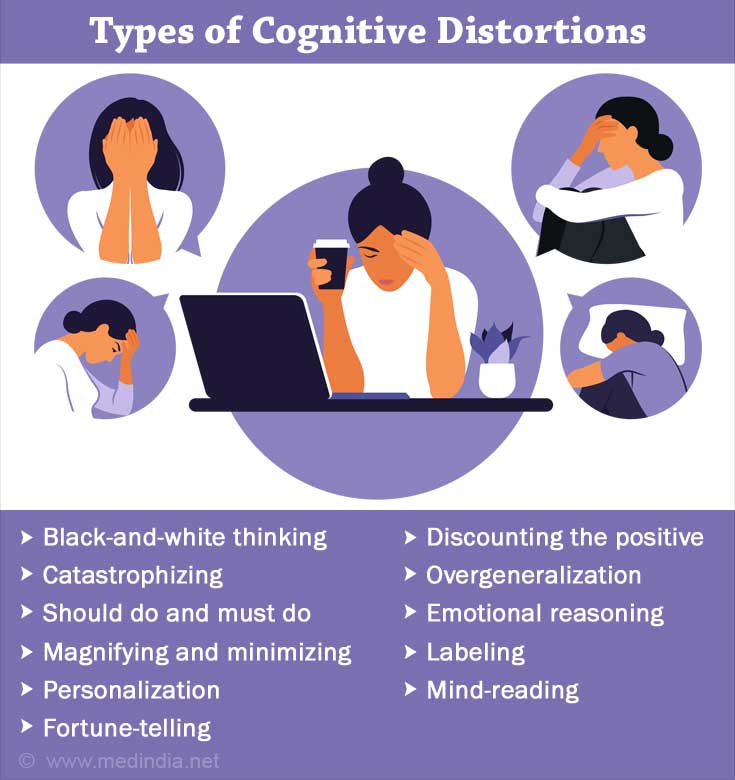- Cognitive Distortions, Humor Styles, and Depression - (https://www.ncbi.nlm.nih.gov/pmc/articles/PMC4991044/)
- 20 Cognitive Distortions and How They Affect Your Life - (https://www.goodtherapy.org/blog/20-cognitive-distortions-and-how-they-affect-your-life-0407154)
- How Depression Affects Your Thinking Skills - (https://neurosciencenews.com/depression-thinking-skills-9297/)
- Where in the Brain Is Depression? - (https://www.ncbi.nlm.nih.gov/pmc/articles/PMC3619732/#:~:text=The%20main%20subcortical%20limbic%20brain,have%20been%20found%20in%20depression.)
- 10 Common Negative Thinking Patterns and 5 Steps for Change - (https://www.familycentre.org/news/post/10-common-negative-thinking-patterns-and-5-steps-for-change)
- How to Change Negative Thinking Patterns - (https://childmind.org/article/how-to-change-negative-thinking-patterns/)
- Negative Thinking - How Do You Change it to Positive Thinking? - (https://www.therapycts.com/blog/2021/3/16/banish-your-inner-critic-how-to-identify-and-change-negative-thought-patterns)
- 4 Ways to Stop Negative Thinking - (https://www.mcleanhospital.org/essential/4-ways-stop-negative-thinking)
- How to Hit the Delete Button on Negative Thoughts - (https://www.psycom.net/negative-thinking)
- Positive thinking: Stop negative self-talk to reduce stress - (https://www.mayoclinic.org/healthy-lifestyle/stress-management/in-depth/positive-thinking/art-20043950)
- What Are Cognitive Distortions and How Can You Change These Thinking Patterns? - (https://www.healthline.com/health/cognitive-distortions#bottom-line)
- 7 Powerful Ways to Stop Negative Thinking - (https://www.lifehack.org/856836/stop-negative-thinking)
- Understanding Generalized Anxiety Disorder -- Diagnosis and Treatment - (https://www.webmd.com/anxiety-panic/guide/understanding-anxiety-treatment#:~:text=The%20most%20prominent%20of%20anti,%2C%20and%20lorazepam%20Ativan.)
- Overview - Selective serotonin reuptake inhibitors (SSRIs) - (https://www.nhs.uk/mental-health/talking-therapies-medicine-treatments/medicines-and-psychiatry/ssri-antidepressants/overview#:~:text=Selective%20serotonin%20reuptake%20inhibitors%20SSRIs%20are%20a%20widely%20used%20type,cognitive%20behavioural%20therapy%20CBT.)
- Tricyclic antidepressants and tetracyclic antidepressants - (https://www.mayoclinic.org/diseases-conditions/depression/in-depth/antidepressants/art-20046983)
What are Irrational Thinking Patterns?
In cognitive therapy, irrational thinking patterns or thinking errors are defined as perceptions that distort reality. These are commonly known as cognitive distortions in the field of psychology.
Cognitive distortions are a cluster of thoughts, attitudes and perceptions that negatively influence our thinking process. When not taken care of, these distortions lead to misery, unfavorable self-image and unhealthy relationships.
It is a natural tendency of the mind to have some kind of bias in perception, predisposition or judgment and it is expected that we are going to suffer from negative thinking patterns from time to time.
However individuals who experience anxiety or depression are likely to experience these cognitive errors for longer periods of time and with greater intensity as compared to individuals without mental health issues.
Since these aspects play an important role in an individual’s life, it is crucial to understand the role of cognitive distortions in depression and anxiety and how to take corrective action.
How Does Anxiety and Depression Distort Your Thinking?
Anxiety and depression have the potential to distort thinking due to the following features:
- Anxiety is characterized by excessive focus on the future, on events that are not taking place in the present and can negatively impact mindfulness. One is constantly in a state of preventing something that is not happening.
- Anxiety also makes a person highly vigilant of their surroundings. This leads to individuals perceiving several stimuli as threats.
- Anxiety feels very urgent and exaggerates the possibility of negative outcomes, while diminishing one’s ability to handle these.
- Depression is a form of highly negative thinking towards oneself, others and life. This prevents one from looking at reality objectively.
- Depression leads to feelings of worthlessness, helplessness and hopelessness, which taint the way one thinks.
- The tendency to isolate oneself when depressed leads to a lack of objective perspective, and counter-productive thinking.
- Both depression and anxiety involve brain areas and neurotransmitters. When these are affected, so are thinking patterns. Brain areas in depression and anxiety that are implicated in thinking, include the prefrontal cortex and the amygdala.
What are the Types of Cognitive Distortions?
There are several types of thinking errors. These are generally seen in both depression and anxiety as the two conditions have a good deal of overlap. Common cognitive distortions in depression and anxiety include:

- Black-and-white thinking – This involves thinking something is either good or bad, there is no grey area in between. For example, thinking that scoring anything less than full marks is bad.
- Catastrophizing – Imagining the worst-case scenario and that things will end terribly.
- Shoulds and Musts – Demanding things of ourselves and others. For example, “I should have gotten selected for the job.”
- Magnifying and Minimizing – This refers to either over exaggerating the consequences of negative events, or downplaying the outcomes of positive events.
- Personalization – This refers to an individual attributing others’ actions and words to themselves by reading into it too much. An example is, thinking, “He did not say hello because he hates me.”
- Fortune-Telling – This suggests that an individual feels he/she can predict the future. This can lead to guilt and anger towards the self for “not knowing better.”
- Discounting the Positive – This is a form of disregarding the positive side of the picture in a given situation, focusing on the negatives.
- Overgeneralization – This is the tendency to assume broad negative conclusions based on few or single events. For example, if I fail this exam, I am a failure in life altogether.
- Emotional Reasoning – Believing that one’s feelings determine reality. Therefore, if one is anxious, then something must be wrong.
- Labeling – Calling oneself or others names such as stupid, lazy, or ugly.
- Mind-Reading – Mind-reading is the tendency to think that one knows what another is thinking or feeling. We only think we know, but we cannot be sure.
What Causes Cognitive Distortions?
Cognitive distortions are caused by various factors including:
- Early adverse experiences such as bullying
- Modeling of negative thinking patterns by parents
- Emotional abuse and neglect as a child
- Genetic factors that are inherited
- Unhealthy parenting styles, such as being over strict or lenient
How to Change Negative Thinking Patterns?

Cognitive distortions can be tackled by using ajournal. This helps one become more aware of one’s thinking patterns, which can help to challenge and then change them. Talking to oneself compassionately is another method, which is crucial. We are often very hard on ourselves. If we were to treat ourselves as a friend, how supportive and encouraging we would be!
Talking to friends can help give a more objective perspective to challenge thinking errors. In addition to this, one can also evaluate how helpful a certain thought is, if it is in alignment with one’s goals, if it is realistic and how it will impact one. Mindfulness exercises can help one become more aware of unhelpful thoughts.
Negative thinking patterns can be changed through the process of counseling.
Therapy helps to uncover the root causes of these core beliefs stemming from childhood. Rational Emotive Behavior Therapy suggests that the way we think determines the way we feel, and therefore act. Cognitive Behavioral Therapy aims to target and challenge unhealthy thinking styles, changing them to more realistic, helpful ways of thinking.
Medication can also help to change thinking patterns by working at the neurotransmitter level. Antidepressants such as SSRIs and tricyclic antidepressants and anti-anxiety pills such as benzodiazepines are helpful.
How to Stop Irrational Thinking?
Though we are not in complete control of our thoughts, certain techniques can help reduce the frequency, and ultimately stop negative thinking. This involves pausing when a thought strikes, and using one’s senses and focusing on the present. Labeling a thought disidentifies with it and makes it a possibility, not the absolute truth. After this, one can choose to disregard the thought.
Facing the thought instead of running away from it, helps to give it only the importance it deserves, and not perceive it as a threat. Practicing positive thinking can help to stop negative thinking. Judging oneself based on one’s thoughts is unhelpful. Finally, seeking professional help is beneficial.









